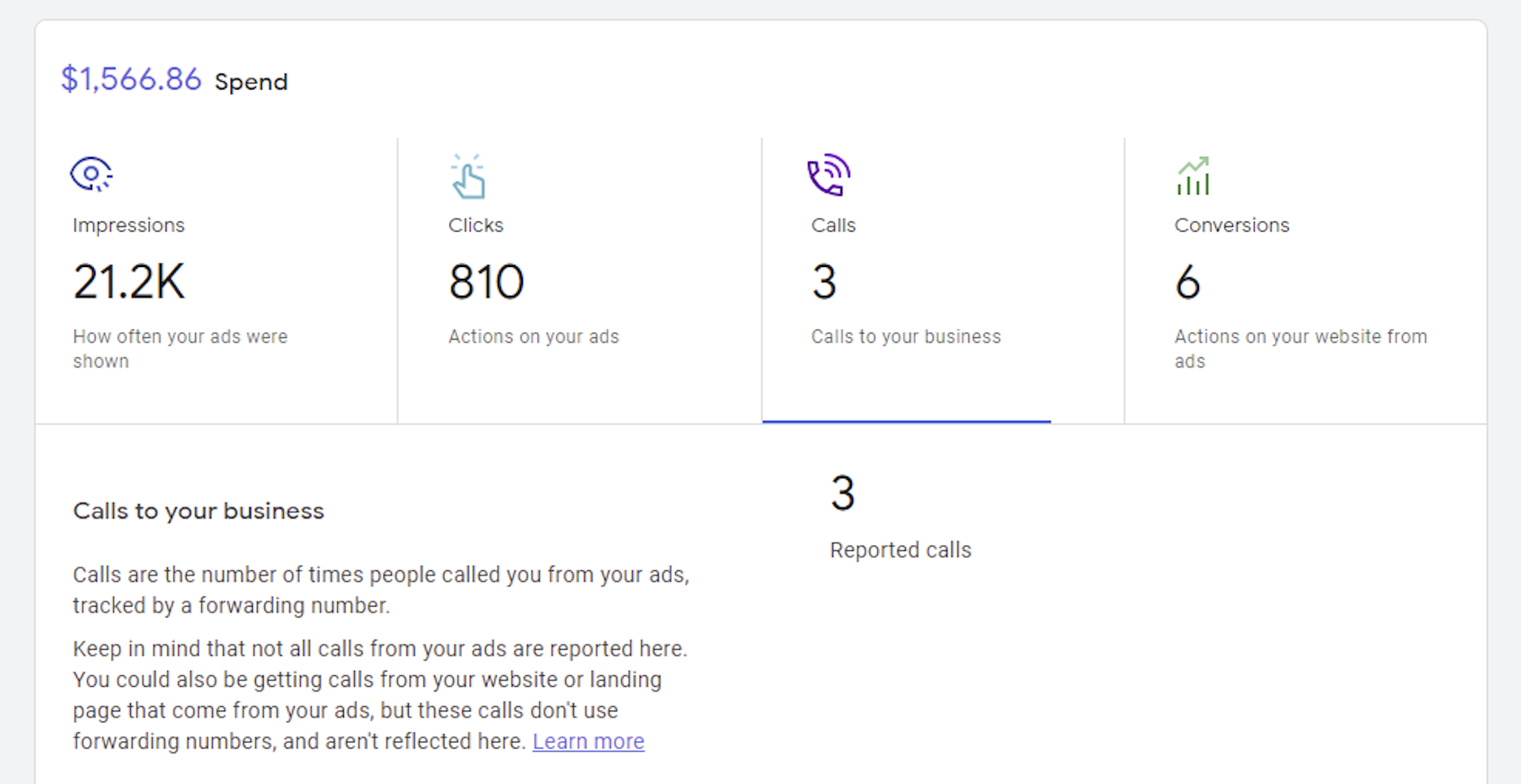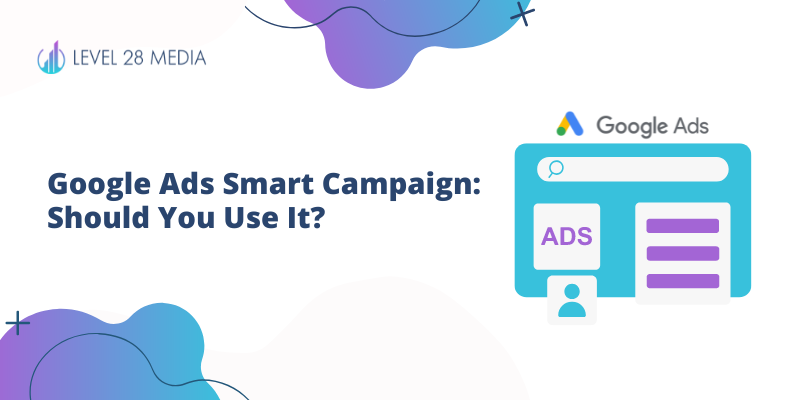Are you considering setting up a Google Ads Smart Campaign? With its promise of simplicity and ease, it’s no wonder they’re enticing to so many business owners!
However, before diving in headfirst, you need to understand how Smart Campaigns work and their limitations. Understanding these key points will help you make an informed decision on whether Smart Campaigns are right for your business.
What Is a Google Ads Smart Campaign?
Google Smart Campaigns harness the power of Google’s automation to simplify the advertising set-up process. Smart Campaigns automate ad creation, bidding strategies, and audience targeting.
Sounds too good to be true? Keep reading.
While you can still select specific keywords, match types are no longer available. Google’s machine learning algorithms take charge of determining the best matches for your ads.
This means set-up can be done within 10 minutes, making it incredibly appealing to Google Ad beginners and small business owners.

Are Google Smart Campaigns Effective?
The effectiveness of Google Smart Campaigns will depend on your PPC goals. Are you looking to generate more leads? Or are you looking to get started to create awareness with limited resources?
Google Smart Campaigns are enticing for small businesses that are tight on cash and looking for an easy way to manage their campaigns.
However, it’s worth noting that experienced advertisers do not typically use Smart Campaigns.
Why? The automated nature of Smart Campaigns leaves little room for fine-tuning and optimization. If you are looking to scale your PPC efforts and are playing with a bigger budget, Smart Campaigns are too limited.
Important Things to Know About Google Ads Smart Campaigns
Be Cautious About the Easy Set-Up
With Smart Campaigns, you can hit the ground running without much effort. However, it’s crucial to be aware that by relying on automation, you’re handing over a significant amount of control to Google.
That’s why the setup is so easy!
Putting your trust in Google makes it more likely that you will overspend. In addition, there is a loss of control over keyword intent and the specific keywords you can choose. While the no-hassle setup may be ideal for small businesses looking for simplicity, it won’t make sense to use Smart Campaigns if you are spending any less thant $1,000 a month on Google Ads.
If you’re serious about achieving impactful results, it’s important to consider whether this level of automation aligns with your goals. More often than not, your business will need a custom strategy.
Limited Data for Decision Making
One major limitation of Google Smart Campaigns is that they provide access to only a limited number of key metrics.
Smart campaigns only share the number of impressions, clicks, ad budget spent, calls, and map actions. This lack of in-depth data can hinder your ability to dive deeper into campaign performance analysis.
You won’t have access to metrics such as Search Impression Share and Ad Quality Score.
With regular search campaigns, having access to a wider range of data empowers better decision-making and optimization. For example, if your click-through rate (CTR) is low, you can adjust your ad copy to improve it.
Similarly, if your landing page isn’t converting effectively then you can make adjustments and test the impact of those changes. You can also remove targeted keywords that are producing clicks but no conversions.
Since Smart Campaigns are so simple, they really can limit what you can do in Google Ads.
Google’s AI and Machine Learning is Running the Show
As we mentioned already, Google’s automation controls many aspects of your campaign.
However, Google doesn’t know the ins and outs of your business. They may choose to use bid strategies like Maximize Clicks or Maximize CPA, but that may not make sense for your business goals. Also, you will not be able to test a new bidding strategy if the campaign is not performing well.
If you are a highly specialized business or have a very specific customer profile, a customized approach with a standard search campaign is critical.
You Can’t Target Specific Keywords
Google doesn’t give you the ability to pick and choose individual keywords. Instead, they serve ads based on keyword themes and what people are searching for.
Now, for some businesses, this can work just fine.
But here’s the catch: if you have specific keywords or ones with a high cost-per-click (CPC), you will be in trouble.
Before setting up your first Smart Campaign, look at the CPC for your targeted keywords. If they are low-cost, it could be worth experimenting with a Smart Campaign.
When it comes to choosing between a Smart Campaign and a Search Campaign, evaluate how important keyword control is for you. Think about how it might impact your campaign’s performance.
If you are in a highly specialized industry where semantics of specific keywords can get mixed up easily like hospice vs palliative care vs home care, it’s recommended not to use Smart Campaigns because you are leaving the definition of matching up to Google to determine what intent matches your keyword themes and this can lead to a lot of wasted spend!
Inaccurate Conversion Tracking
One thing you need to watch out for with Smart Campaigns is the limited conversion tracking options.
Google takes charge and sets up its conversions to track within your Smart Campaign. But here’s the catch—it might not match up with what you consider a successful campaign.
Google might count things like page views or store visits as conversions, which make your performance metrics look inflated and make it seem like your Smart Campaign is performing well. Don’t get fooled by the numbers! We’ve seen this with many potential clients who believe their accounts are performing extremely well but we showed them that their real conversion numbers were being inflated by arbitrary conversion numbers.
To get a more accurate picture and a better understanding of how your campaign is performing, take time to review and customize your conversion tracking options.
Should You Use a Google Ads Smart Campaign?
Small businesses need to think twice about using Google Smart Campaigns. A simplified approach sounds appealing, but if you can’t afford to do PPC right, then your business may not be ready for it.
You will lose out on a lot of money and time by not having granular customization options. As we said previously, Google does not truly understand your business if it’s relying on automation.
At Level 28 Media, we never use Smart Campaigns because of less control and granularity in reaching the right audience. With PPC, it’s all about reaching the right audience and Smart Campaigns can hinder that.

Michelle Kop is a marketing consultant and award-winning pay-per-click marketing strategist. She has over 8 years of professional paid advertising experience in Google and Microsoft Ads, with a specialization in lead generation for B2B and B2C companies.
After working in corporate marketing with Fortune Global 500 Brands like Toyota and BP, Michelle founded Level 28 Media, a lead generation micro-agency for small to medium businesses.

